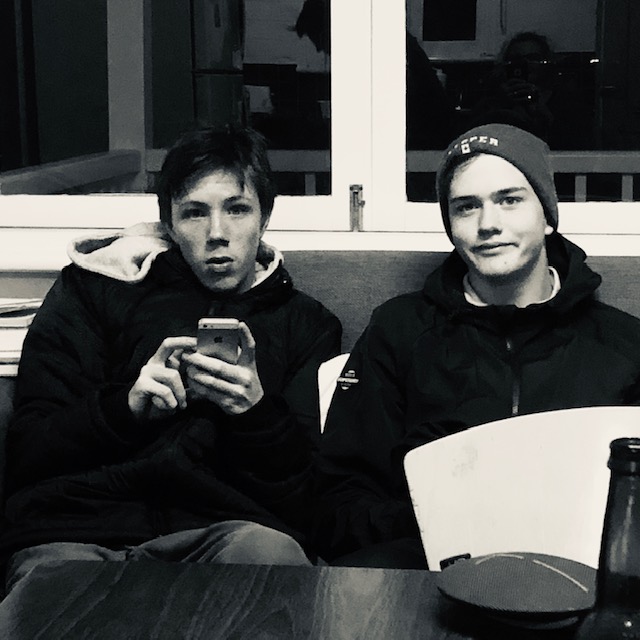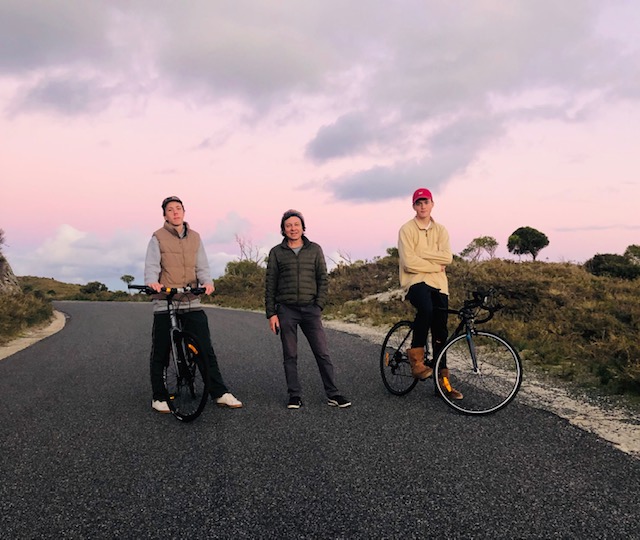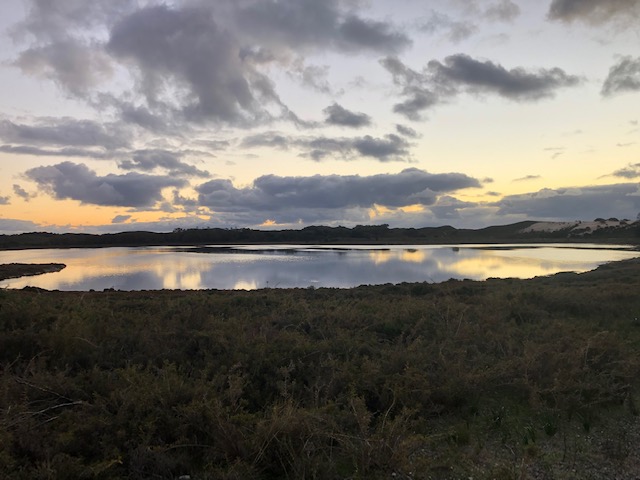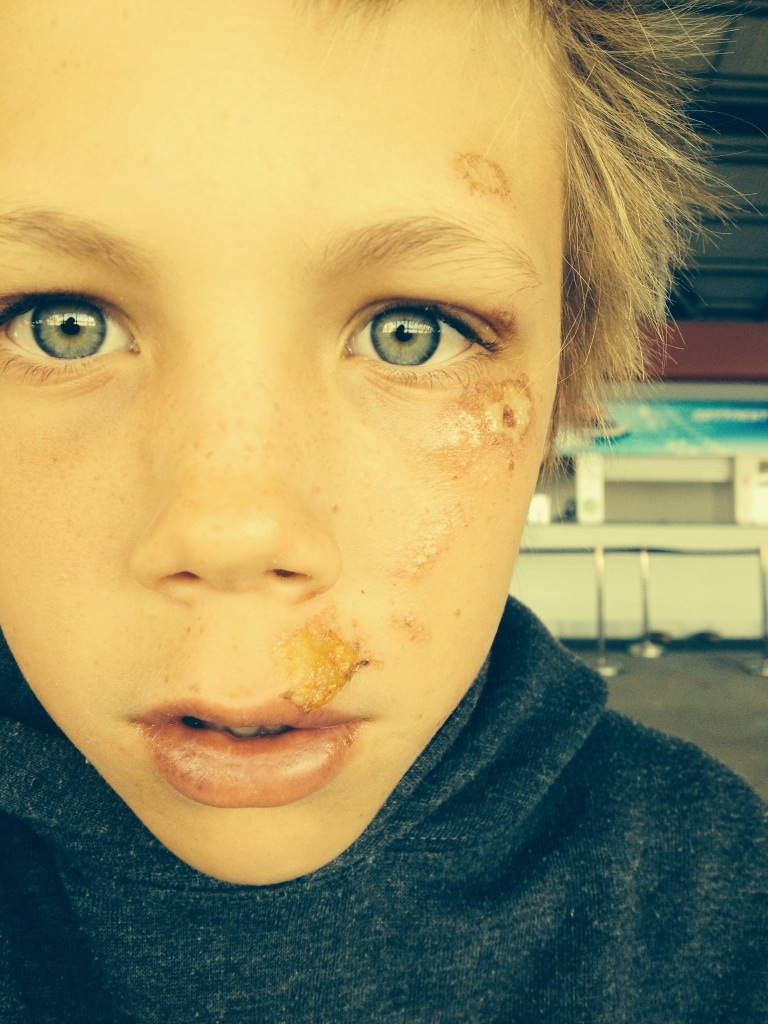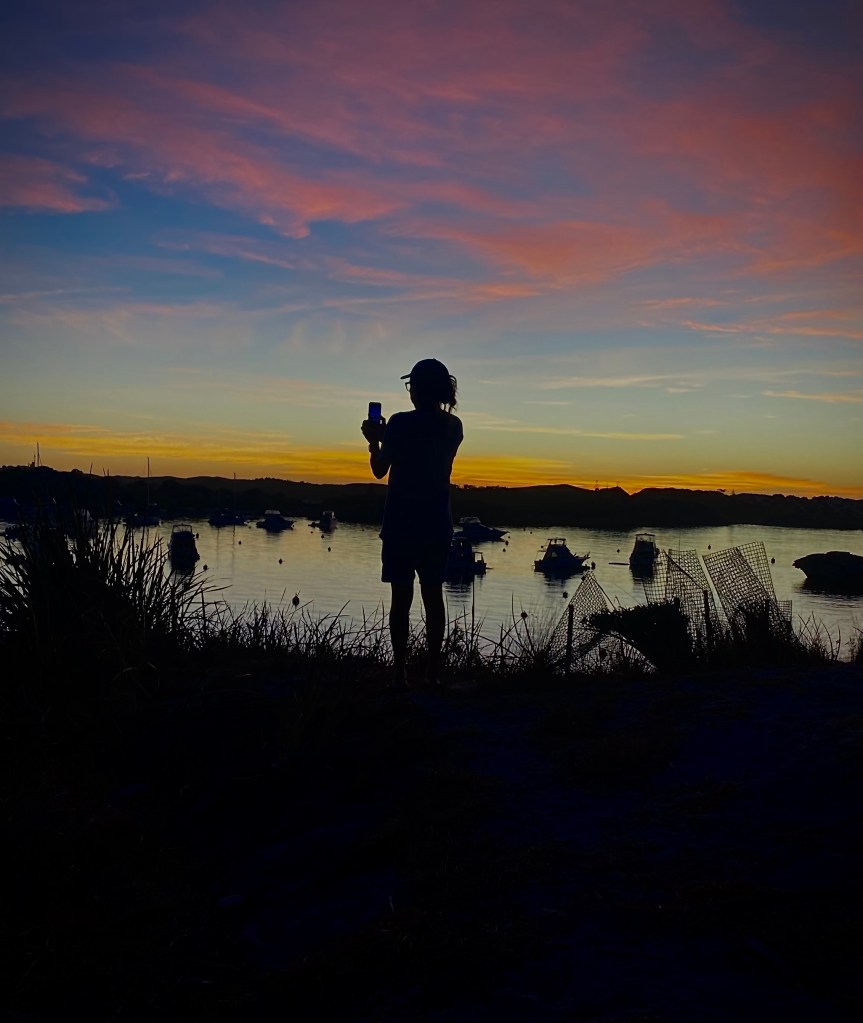
It is the last day of a two week stay.
This is a luxury that few can/do indulge in. We have seen the chalets next to us empty over and over again; the fresh sheets deposited, the cleaners come in, play loud music and bang around indoors. Slam doors. Clean?
Most people seem to only have a few days, and the lucky ones an entire week but we have 14 impossible days. Fourteen! So long, that when the holiday begins there is no counting down. This really does make the unwinding easy.
It is hot, sure here, but worse on the mainland. A plume of heavy smoke rises from the mainland then drifts and fades across the horizon, and a bush fire is presumed. It is a long way away. Fire is frequent. Perth is a tinder box. No longer is it a surprise to hear the radio give a warning to “leave now or be prepared to defend your home”. “It is no longer safe to leave, choose a room with two exits and running water.” Good grief.
Our tenant in Fremantle has a broken air-conditioner. No air conditioner at Longreach and fans with cut off arms that blow mere wisps of warm air. But we have the sea a few metres from our door. From here organising a new Daikin is a challenge. G has Telstra, check the reviews. In this heat the quotes go through the roof. Ten grand! “It’s brutal” writes the tenant:, the heat, even in Freo. We can plonk ourselves in when the heat overtakes us. We can get a fancy Campari drink with a slice of orange and lots of ice and carry it to the beach and sit in the water whilst wearing prescription sunnies and a hat!

If Rottnest were to burn I imagine sitting here in the safety of the blue water, delivered here swiftly through the muscles of others, safe all the same. Different if a plane were to go down I sometimes think. Would I be abandoned by the rush of people to get away from the burning craft and down the inflatable slide. I am amused and thankful the way airline staff instruct me that in an emergency they will assist me, but really? I might succumb. I am ready to go down with the plane.
The water has been clear and the reeds wave underneath as I swim. Languid. Me in slow motion. Mike says it is good swim with me. Slow. No pressure. Sometimes there are silver fish near the surface and bigger blotchy well-disguised ones in the seagrass. The snorkelers know their names. There are rays too. The bird watchers spot a black shoulder kite and a kingfisher.
Something happens around middle age when men (and some women, although decidedly less I think) become fascinated by birds of the feathered kind; seeing them, hearing them, pointing them out, offering the binoculars to the less fascinated. There are binoculars that you can get that tell you the name of the bird you are looking at. Does that spoil the not knowing? There is an app that can identify them by the sound they make. It confuses the hell out of the birds too as they hear some other non existent bird chirping back at them. There is an app that you can point to the stars in the night sky and be told what is the star you are looking at. Jupiter! There is an app that tells you what the ship sliding across the horizon is called and where’s its home port and what cargo it carries. (We keep track of the jilted sheep carrier that has drifted back and forth for over a month now while no one with authority knows what should be done. And the sheep are just fine, far away enough from shore not to pique any nostrils.)There’s an app that Jane uses to teach herself Spanish (it dings and pings) and a word game that Liz plays. G has several to work through each morning and the list is growing
G has a manuscript to read. I have read mine. But first he has worldle and wordle and quordle and squaredle and…
My phone is only receiving SOS and hence I have no apps. App-less. This is a welcomed unburdening. At least I will know about The Fire if it hits.
A misty rain has fallen on the last day and I wonder if the chalk has been wiped from the road. “Henry and Charlie Stop” with a solid line and repeated a few hundred metres further on. Is this a parent’s instruction to small children to not go further or is this part of a game, a race between small boys that marks a beginning and an end? Is this a worried mother who does not realise that there is no need for barriers and rules at Rottnest. As long as the kid can swim.
Tourists get unbearably close to the quokkas. So close they are almost kissing the comatosed marsupial, down on their hands and knees with their phone in the face of the small unmoving critter. We have Federer to blame for this phenomenon. Despite the signage there is still petting and poking, allowing sips of water from takeaway cups, bowls put out beside chalets.
G hates a cabana. He especially hates the blue and white stripes. An almost identical structure, but of a solid colour does not get the same derision as the blue and white cabana.
A bird has pooed on our bedsheet. It must have made its way through the open window to see what goodies could be had. It is a big poo with sand in it and we presume it is a seagull till the raven shows itself as a thief on other persons balconies. Smart not scared, ballsy birds. King of birds. Argh Argh.
On the shore line, a baby seagull, although as big as his mother, beeps continuously at the nurturing bird. It follows and squeaks at her. It bothers her about her bill. She moves her head away and sometimes steps away from him but the baby is always there, right behind or beside her. Clamped on. Mum, Mum. Sometimes she flies off and then the baby is immediately silent as if the cry would tell other birds he was vulnerable and alone. He is only annoying and a cry baby when his mother is right there. Sound familiar?
There was a time when I could climb the hills with the power of my own shoulders but now like others I have lithium. All sorts zoom by on all sorts of powered mobiles and I wonder when as a species we will give up legs entirely. G makes the effort still and despite a back pack the weight of a coke drinking toddler he is determined to make every hill, not rising from the saddle, like Lance’s great rival. No one recalls his name.
Mother to small school age girls at the stairs that lead to the beach:
“Look where you are?”
“Your friends are back in Perth on the oval, the oval!”
“You are by the ocean!”
She pleads with them not to splash her, she’s exhausted.
She gets up from a cross-legged position effortlessly, no hands.
This is one of the things I am looking for. How easily do people get up and down from the sand? Do you have to roll over onto your hands and knees and push up? Do you ask your partner to give you their outstretched hand? This skill might save you from an old person’s home. Practice now. Get up off the floor and keep doing it. Whatever way you can. On your own.
Instead the older people stand on the beach. They contemplate getting down. You can see it cross their mind. But then wonder if they will ever get up again. It is along way down and even a longer way up. Instead stand around for a short while, make like you want to dry off, that you don’t like the sand, then go back to the chalet. Or buy a chair.
Small child to other small child on balcony:
“Josh, if there is a fire on the balcony, what would you rather? Burn or Jump off?”
For two days I have pain. So much pain that I could hardly roll over in the bed. I lay there and wondered if I should go home early. But that would mean busting in on J and his lemon tart party. G is at the golf course while the fog still hangs across the greens. Why be here in pain? Like the school children. Look where you are. If you can rise from the bed? Can you see the ocean from the bed? A swim helps, stretches, pain killers. Swimming. The ocean the great healer. Each stroke. A balm for more than muscle.
We talk about swimming. Always how? How to continuously stay afloat without pain, with breath, without exhaustion, with ease. Imagine swimming the Rotto Swim? He has filmed me. Really am I that slow? Did you take it in slow motion? No. I film G and later we look at the film. It is a blurred pink thumb of mine across the lens. His stroke is there, somewhere, behind my thumb. Ha. We laugh. Really laugh, deep down in the belly. That is good for your swimming. Laughing.

Tonight the sea breeze is in. We haven’t had it for days and mostly the bay has been a hazy blue and purple. It has been slick and smooth. Cataract blue. There is the slap of the waves on the shore line and the incessant thwack of flyscreen doors that cannot close properly. We have new neighbours and their children freely roam the beach and paddle out to a boat a father has motored over in. There was some early tension over the getting of the key and the usual palaver over credentials not sighted but all is recovered now, tinnies of Swan draught collect about the legs of the chairs. The oyster catcher is the only lone creature on the beach; his red bill deftly pokes the sand as he carefully places one foot down followed by the other.


